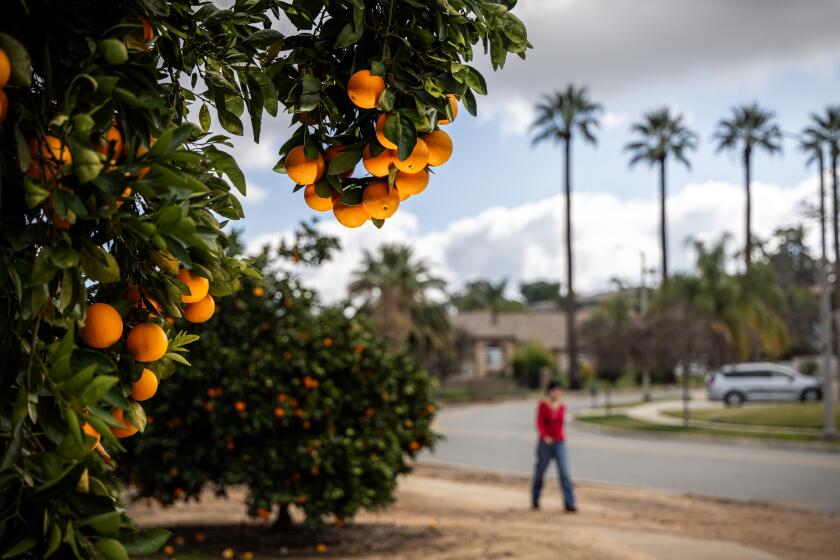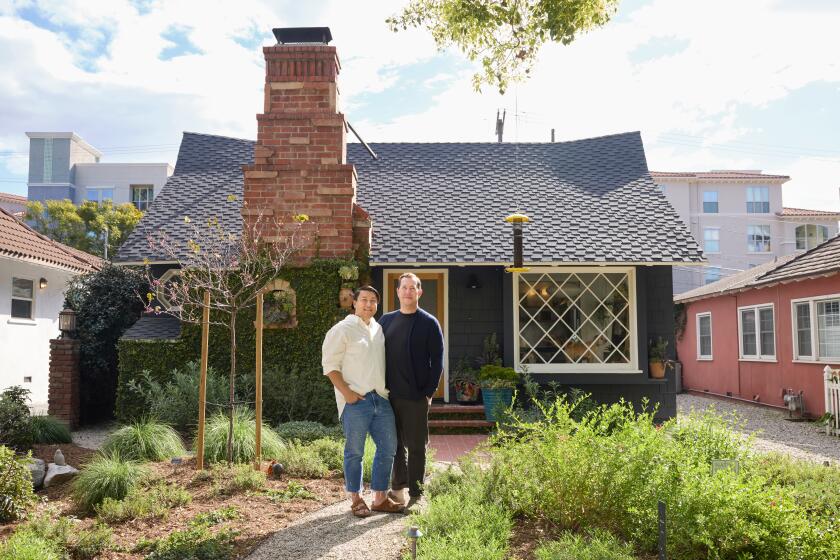City Undercuts Efforts to Save Hosp Grove
‘Beware of listening to this imposter; you are undone if you once forget that the fruits of the earth belong to us all, and the earth itself to nobody.’
From Jean Jacques Rousseau
Some say Hosp Grove is haunted, that the towering trunks of its 80-year-old eucalyptus trees could tell tales if they chose of maledictions that would send shivers down the spines of its corporate landowners and developers. Accursed, some say, is the wanton destruction of woodlands.
And so it may be, judging by the community uprising earlier this year over the proposal to develop half of the forest’s remaining unspoiled acres.
Though in truth, Carlsbad’s Hosp Grove hardly qualifies as the forest primeval. Planted for commercial purposes by nurseryman Franz Hosp in the early 1900s, the gauntly beautiful trees were saved from the sawmill by their congenital unfitness for use as railroad ties.
This droll botanical joke on the entrepreneurs has not hurt the grove’s value as a symbol of residents’ resistance to rampant development. We identify with the trees.
Last February thousands of residents signed petitions; hundreds overflowed the council chambers. But the only ghosts heard from that night were civilized ghosts, the same three 18th-Century spirits who have been contending for America’s soul from the beginning.
The stern ghost of Adam Smith, godfather of private enterprise pragmatists who believe in the supremacy of economic values, was there. The most extreme of his followers would happily deregulate land use if they could (which the U.S. Supreme Court has repeatedly said they cannot)--would make the marketplace the arbiter of zoning, would ban citizens’ land-use initiatives and burn the Coastal Act of 1976 along with every last bleeding-heart environmental protection statute on the books.
There, too, was the impassioned ghost of Jean Jacques Rousseau, patron saint of the romantically idealistic, back-to-nature Utopians. His most fanatic disciples yearn to re-create the landscape of a vague yesteryear, before freeways, condos and shopping malls--though not, presumably, before water districts and power lines.
And fortunately for the mainstream, the ghost of Thomas Jefferson--the conscience of American democracy--was also there. The least dogmatic of the three, his was the voice advocating the will of the majority, who in Carlsbad believe in private property and free enterprise but also in the social and moral importance of protecting Earth’s natural beauty, resources and ecology.
Adam Smith won. The logic of the marketplace prevailed.
Six months after the virtually unanimous outcry for preserving the last 50 acres of woods and wildlife, the City Council announced it had cut a deal with the developers. A slap in the face to citizens, the council’s deal, engineered by top city staff, is an ultimatum to the electorate: either pass a $6-million dollar bond issue to finance outright acquisition in fee of all 50 acres or grin and bear the development agreement we negotiated. Put up or shut up.
If the $6-million bond issue fails, the developers get to bulldoze one entire virgin slope for commercial development, put office buildings on another, build a hundred more condos in already broached sections of the grove, and--the topper--sell to the city for a mere $975,000 the remaining 32 acres of grove holdings, roughly 80% of which are already protected from development because they are too steep to build on or already designated open space or dedicated park land.
(The current landowners bought the entire 223 acres of “Hosp Eucalyptus Forest Inc.” for $400,000 in the early ‘60s.)
The development agreement was presented to the citizens as a done deal, effectively exempt from public review and input, though the council still must hold the legally required public hearings--surely pro forma at this point--before approving each of the development rights that are a condition of sale.
Experts in local government’s options for protecting open space confirm the common sense reaction of Carlsbad citizens that the city used its powers to protect the developers from the citizens, not the other way around. The developers can’t lose now and the citizens can’t win.
The official justification: the city’s options were constrained by a successful lawsuit brought by Hosp Grove developers during the Carlsbad sewer moratorium of the early 1970s. City staff thought it preferable to “work closely with the developers” during recent negotiations than to face threatened litigation claiming sewer entitlements awarded then (some half of which have not yet been used) are equivalent to development rights today.
The Hosp Grove affair underscores the growing realization that citizens, who pay millions for the services of city staff and have entrusted their power to a democratically chosen few, nonetheless have virtually no aggressive advocates at City Hall but volunteer neighborhood groups such as the Neighborhood Alliance to Save Hosp Grove--most of whose leaders, cynical politicians take note, work in development-related fields.
No wonder citizens in more than 40 California cities and counties have passed initiatives restricting the land-use power of elected officials. No wonder the residents of Carlsbad are expected to approve overwhelmingly the slow-growth initiative slated to appear, ironically, on the same ballot as the Hosp Grove bond issue--an initiative which, if successful, would almost certainly have affected development of the grove had the city not agreed to purchase or rezone the land.
Thanks to the council’s foreclosure of all other options, the fate of Hosp Grove now rests heavily on the voters, where the followers of Adam Smith say it belongs. Given two bad choices--bonds or bulldozers--most Carlsbad citizens, I predict, will grudgingly go with the bonds, though the chances for a two-thirds majority in these tax-conscious times are slim, as city officials well know.
Meanwhile, the ghost of Rousseau stalks the midnight grove: “From how many crimes, wars, and murders, from how many horrors and misfortunes might any one have saved mankind by pulling up the stakes (of the first man who privatized property) and crying, ‘Beware of listening to this imposter; you are undone if you once forget that the fruits of the earth belong to us all, and the earth itself to nobody.’ ”
And the spirits of the forest--unschooled in the realities and ideologies of our times--send a sign of assent whispering through the trees.



